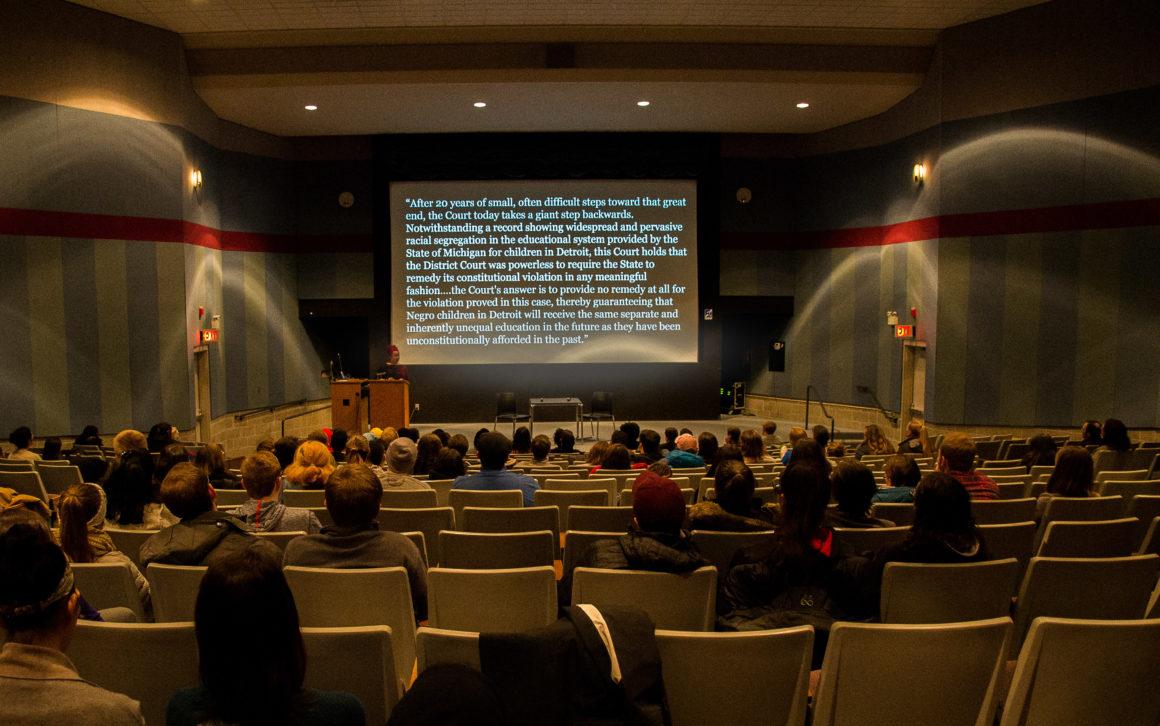Although the urban education systems of cities may seem far removed from rural Grinnell, last Thursday, Feb. 22, the Urban Education symposium covered just that. In reality, though, urban education is not as far removed from the Iowa corn fields as one might think.
“It’s important to know that education was the second most common immediate career field for the College’s class of 2016,” wrote Dan Covino, director of the Education Professions Career Community within the Center for Careers, Life, and Service and the Rosenfield Program, in an email to The S&B. Covino also noted that of the alumni that go into teaching work, many teach in urban areas.
“Although urban education might seem far removed from Grinnell, it is a common career destination for our graduates. I hope the symposium provides students who are considering teaching in cities with some idea of the policy questions urban districts confront and the realities urban teachers face,” Covino wrote.
Beyond post-college career choices, the topic of urban education holds relevance for various members of both the College and local communities.
“Many of the issues (e.g. school choice, segregation, unequal access to educational opportunities) that our speakers will discuss affect education across the United States, not just American cities. … Since these issues affect education across locations, I hope many community members from Grinnell and surrounding communities will benefit from the symposium events as well,” Covino wrote.
The Symposium consisted of three events: “School Segregation in the 21st Century: Conflicts over Education Equality and Community Control” presented by Rachel Moskowitz ’06, assistant professor of public policy and law at Trinity College in Connecticut; “Inside the Urban Classroom,” a panel discussion between alumni urban educators Emily Kugisaki ’09, Anna Taylor ’06 and Erin Whalen ’12; and a keynote speech by New York Times investigative journalist Nikole Hannah-Jones, followed by a discussion with Stephanie Jones, professor of education.
“When designing the symposium, I sought to include events that would cater to the interests of different audiences. For example, I know from advising appointments with students that many are interested in education policy. [Dr. Rachel Moskowitz] is a professor whose research focuses on the politics of urban education reform. Her talk will provide insight for all attendees, but especially for those who are primarily interested in education policy reform. Likewise, since I know many students in the Ed Pros community are interested in teaching, I wanted to include a space to hear current teachers’ voices. I was lucky enough to add the alumni panel of teachers,” Covino wrote.
The keynote address was delivered by Hannah-Jones, whose invitation was the impetus for the Symposium’s topic.

“Shortly after starting in my position as the Director of the Education Professions Career Community, in mid-July, I knew I would be planning a symposium for this spring but I hadn’t chosen a topic,” Covino wrote. “I asked Education Department faculty members for ideas about topics and speakers they would be interested in bringing to campus. Professor Stephanie Jones (Education) suggested that [Hannah-Jones] would make a great keynote speaker. Since much of Nikole’s work is about the re-segregation of American urban schools … the theme of urban education grew from there.”
Hannah-Jones presented a keynote entitled “Focusing on the Role of Inequality and Segregation in Public Education.” This keynote address speaks to Hannah-Jones’ expertise within the field of racial segregation. She was awarded the MacArthur Genius Grant in 2017 for her reporting on school segregation and reports on this topic for The New York Times Magazine. Hannah-Jones is currently writing a book about school segregation entitled “The Problem We All Live With.” Hannah-Jones also helped found the Ida B. Wells Society for Investigative Reporting, an organization that aims to increase the amount of investigative reporters of color.
The Symposium is mainly sponsored by Grinnell College Education Professions Career Community, with help from the education Department, the gender, women’s and sexuality studies department and the political science department.
“The symposium’s underlying themes are multidisciplinary, which is one reason why several departments co-sponsored this event. I hope that the symposium provides insights for students across the campus, not just future educators,” Covino wrote.





















































